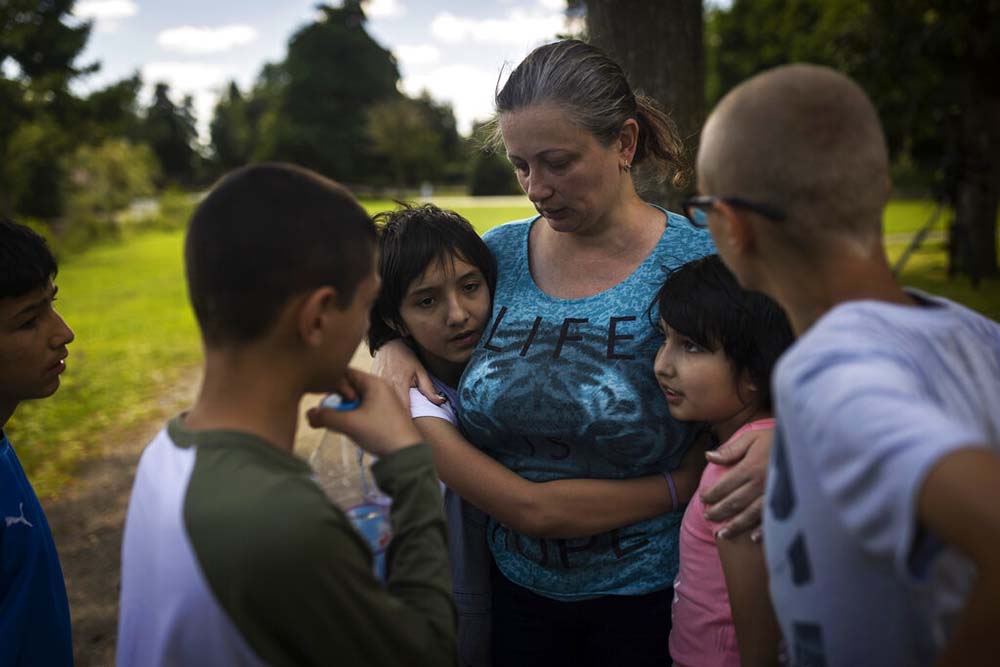
Olga Lopatkina paced around her basement like a trapped animal. She hadn't heard from her six adopted children stranded in Mariupol for over a week, and she didn't know what to do.
The family would end up getting caught up in one of the most explosive issues of the war: Russia's open effort to take Ukrainian orphans and bring them up as Russian.
An Associated Press investigation shows that Russia's strategy is well underway. Thousands of children have been taken from basements of bombed-out cities like Mariupol and from orphanages in the Russian-backed separatist territories of Donbas. They include those whose parents were killed by Russian shelling, and others in institutions or with foster families.
[caption id="attachment_29610" align="alignnone" width="1000"]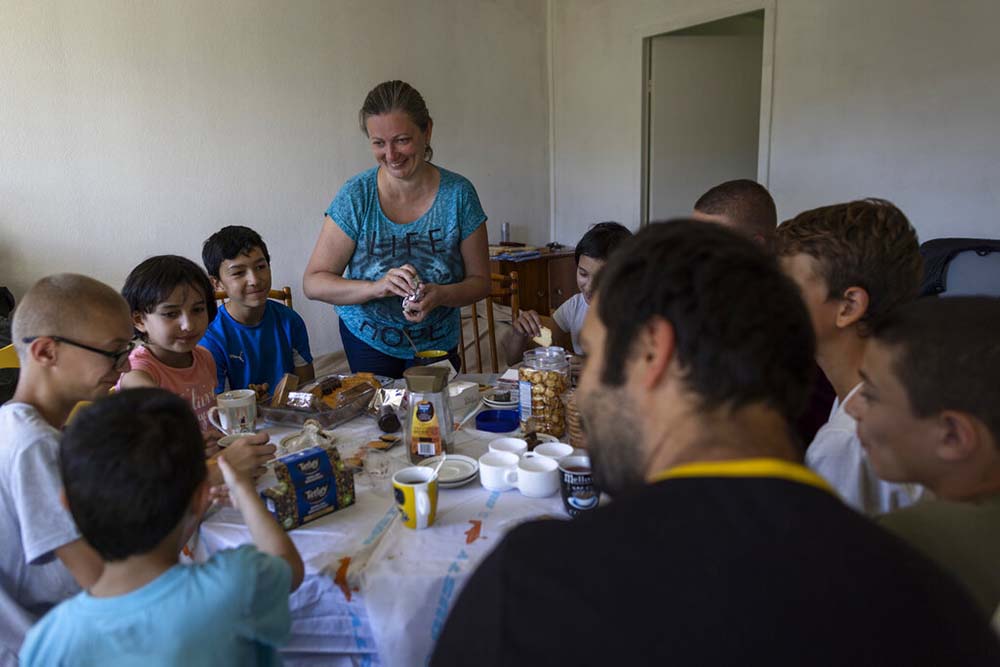 Olga Lopatkina, centre, serves her family a snack, in Loue, western France, on Saturday, July 2, 2022. Photo: AP via RSS[/caption]
Russia claims many of these children have no parents or guardians, or that they can't be reached. But the AP found that officials have deported Ukrainian children to Russia or Russian-held territories without consent, lied to them that they weren't wanted by their parents, and given them Russian families and citizenship.
The investigation is the most extensive to date on the grab of Ukrainian orphans, and the first to follow the process all the way to those already growing up in Russia. It drew on dozens of interviews with parents, children and officials in Ukraine and Russia; emails and letters; Russian documents and Russian state media.
[caption id="attachment_29613" align="alignnone" width="1000"]
Olga Lopatkina, centre, serves her family a snack, in Loue, western France, on Saturday, July 2, 2022. Photo: AP via RSS[/caption]
Russia claims many of these children have no parents or guardians, or that they can't be reached. But the AP found that officials have deported Ukrainian children to Russia or Russian-held territories without consent, lied to them that they weren't wanted by their parents, and given them Russian families and citizenship.
The investigation is the most extensive to date on the grab of Ukrainian orphans, and the first to follow the process all the way to those already growing up in Russia. It drew on dozens of interviews with parents, children and officials in Ukraine and Russia; emails and letters; Russian documents and Russian state media.
[caption id="attachment_29613" align="alignnone" width="1000"]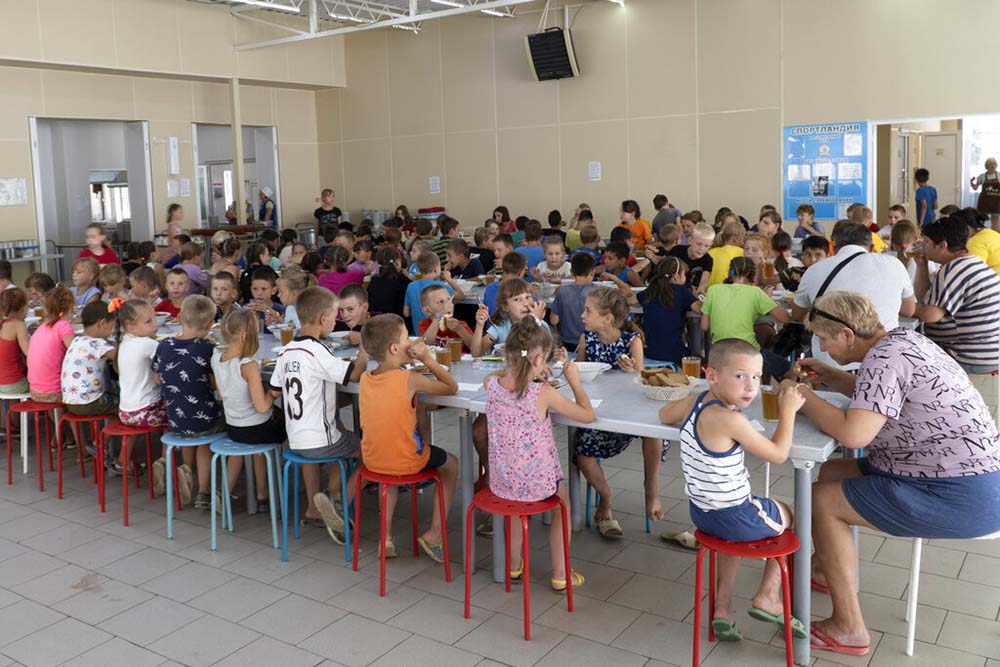 Children from different orphanages from the Donetsk region eat a meal at a camp in Zolotaya Kosa, the settlement on the Sea of Azov, Rostov region, southwestern Russia, on Friday, July 8, 2022. Photo: AP via RSS[/caption]
Raising the children of war in another country or culture can be a marker of genocide, an attempt to erase a people's very identity. Prosecutors tie the policy directly to Russian President Vladimir Putin.
"It's not something that happens spur of the moment on the battlefield," said Stephen Rapp, a former U.S. Ambassador-at-Large for War Crimes Issues who is advising Ukraine on prosecutions.
Russian law prohibits the adoption of foreign children. But in May, Putin signed a decree expediting granting Russian citizenship to Ukrainian children without parental care.
Russia has prepared a register of suitable Russian families for Ukrainian children and offers substantial financial support. It portrays the adoption as an act of generosity. Russian state television airs ceremonies of officials handing out passports to Ukrainian children.
[caption id="attachment_29611" align="alignnone" width="1000"]
Children from different orphanages from the Donetsk region eat a meal at a camp in Zolotaya Kosa, the settlement on the Sea of Azov, Rostov region, southwestern Russia, on Friday, July 8, 2022. Photo: AP via RSS[/caption]
Raising the children of war in another country or culture can be a marker of genocide, an attempt to erase a people's very identity. Prosecutors tie the policy directly to Russian President Vladimir Putin.
"It's not something that happens spur of the moment on the battlefield," said Stephen Rapp, a former U.S. Ambassador-at-Large for War Crimes Issues who is advising Ukraine on prosecutions.
Russian law prohibits the adoption of foreign children. But in May, Putin signed a decree expediting granting Russian citizenship to Ukrainian children without parental care.
Russia has prepared a register of suitable Russian families for Ukrainian children and offers substantial financial support. It portrays the adoption as an act of generosity. Russian state television airs ceremonies of officials handing out passports to Ukrainian children.
[caption id="attachment_29611" align="alignnone" width="1000"]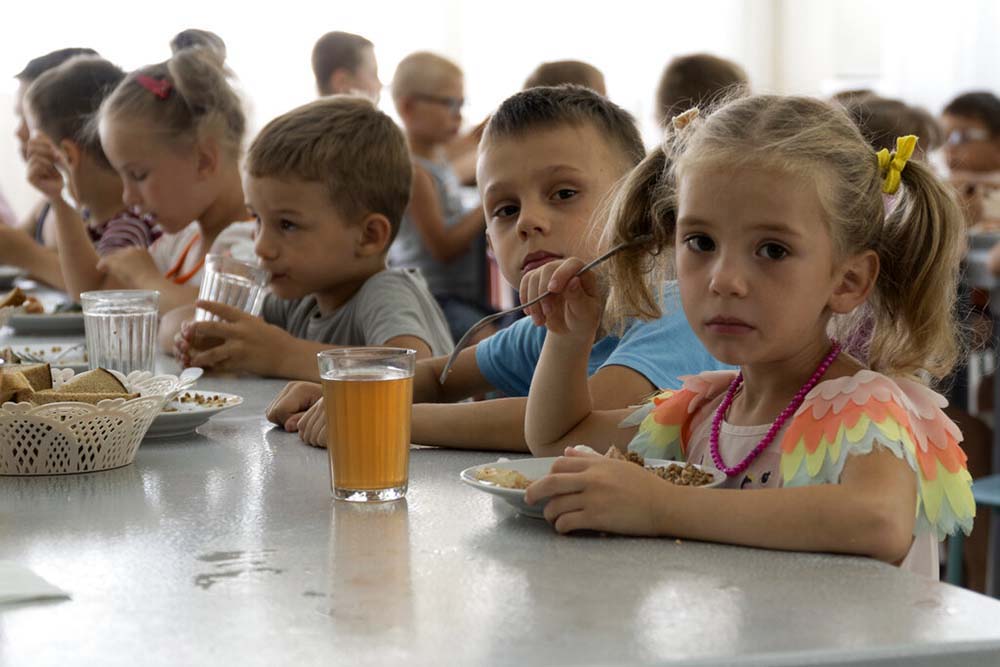 Children from an orphanage in the Donetsk region, eat a meal at a camp in Zolotaya Kosa, the settlement on the Sea of Azov, Rostov region, southwestern Russia, on Friday, July 8, 2022. Photo: AP via RSS[/caption]
How many is hard to say. Ukrainian officials claim nearly 8,000 children have been deported to Russia.
Russia hasn't given an overall number. In March, Russian children's rights ombudswoman Maria Lvova-Belova said 1,000 children from Ukraine were in Russia. Many more have come since, including over 230 in early October.
Lvova-Belova herself has taken in a Mariupol teenager and has been sanctioned by the US Treasury Department, the European Union, Canada and Australia. Her office referred the AP to her reply in astate-owned news agencythat Russia was "helping children to preserve their right to live under a peaceful sky and be happy."
The AP visited a leafy seaside camp near Taganrog, where hundreds of Ukrainian orphans were housed.
One professional foster mother in the Moscow region said the local social services called her to take in Ukrainian children. Already fostering six Russian kids, she picked three from Mariupol. After a guardianship court case in now occupied-Mariupol, she was granted custody of the children, who are now Russian citizens.
The children said after their foster mother dropped them off at a bunker in Mariupol, the Russian military got them out. They had to choose between the adoption by a Russian family and life in a Russian orphanage.
At the house with a courtyard and inflatable swimming pool, the 15-year-old girl said she is eager to start a new life in Russia — in part because her school in Ukraine was bombed, one of her classmates died, and almost everyone has left.
[caption id="attachment_29609" align="alignnone" width="1000"]
Children from an orphanage in the Donetsk region, eat a meal at a camp in Zolotaya Kosa, the settlement on the Sea of Azov, Rostov region, southwestern Russia, on Friday, July 8, 2022. Photo: AP via RSS[/caption]
How many is hard to say. Ukrainian officials claim nearly 8,000 children have been deported to Russia.
Russia hasn't given an overall number. In March, Russian children's rights ombudswoman Maria Lvova-Belova said 1,000 children from Ukraine were in Russia. Many more have come since, including over 230 in early October.
Lvova-Belova herself has taken in a Mariupol teenager and has been sanctioned by the US Treasury Department, the European Union, Canada and Australia. Her office referred the AP to her reply in astate-owned news agencythat Russia was "helping children to preserve their right to live under a peaceful sky and be happy."
The AP visited a leafy seaside camp near Taganrog, where hundreds of Ukrainian orphans were housed.
One professional foster mother in the Moscow region said the local social services called her to take in Ukrainian children. Already fostering six Russian kids, she picked three from Mariupol. After a guardianship court case in now occupied-Mariupol, she was granted custody of the children, who are now Russian citizens.
The children said after their foster mother dropped them off at a bunker in Mariupol, the Russian military got them out. They had to choose between the adoption by a Russian family and life in a Russian orphanage.
At the house with a courtyard and inflatable swimming pool, the 15-year-old girl said she is eager to start a new life in Russia — in part because her school in Ukraine was bombed, one of her classmates died, and almost everyone has left.
[caption id="attachment_29609" align="alignnone" width="1000"]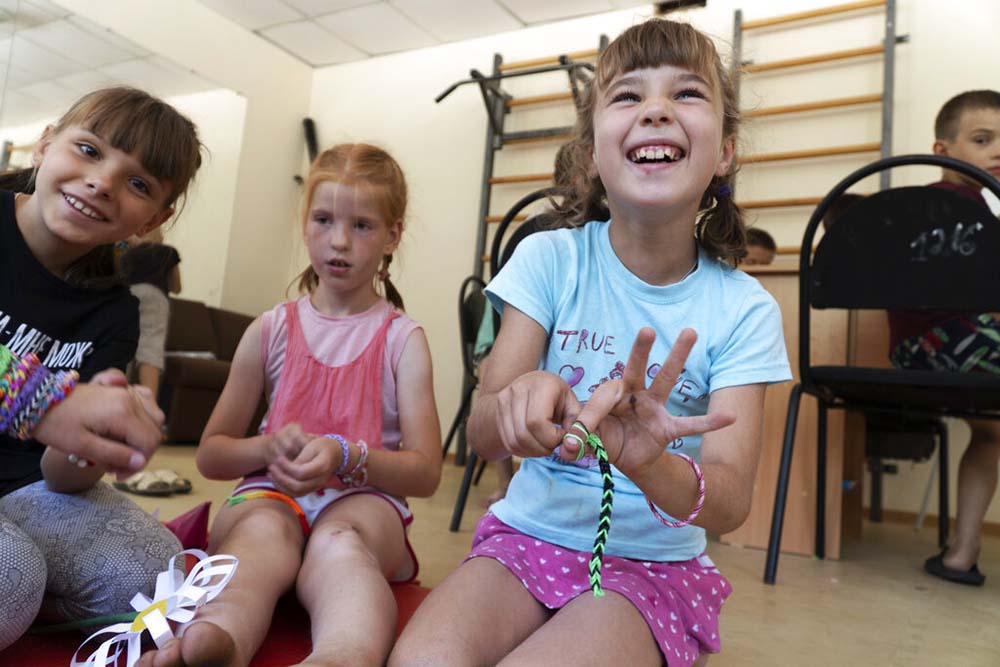 Diana, left, Lena and Sonya, right, from the Donetsk region craft in the playroom at a camp in Zolotaya Kosa, the settlement on the Sea of Azov, Rostov region, southwestern Russia, on Friday, July 8, 2022. Photo: AP via RSS[/caption]
Russia was also accused of stealing children from Ukraine in 2014 after it annexed the Crimean Peninsula. Then, Ukraine reported to the European Court of Human Rights that more than 80 children from Luhansk were abducted at a checkpoint and taken to Russia. Separately, Russian families adopted at least 30 children from Crimea.
This time, at least 96 children have been returned to Ukraine since March following negotiations, some at top government levels.
In Mariupol, Lopatkina's kids cowered for days in a basement at the resort where they'd been vacationing. The 17-year-old foster son, Timofey, minded his younger siblings — three with chronic illnesses or disabilities.
They lost contact with their mother when the power went out across the city. Then a Mariupol doctor succeeded in evacuating them — only to be turned back by pro-Russia forces at a checkpoint. They ended up in a hospital in the separatist Russian-controlled Donetsk People's Republic or DPR.
When Timofey messaged his mother, she was already out of the country. He was livid.
It took a few calls for Olga Lopatkina to explain to Timofey what had happened.
For the music and arts teacher who had lost her mother as a teenager and her home in 2014 fighting, the nightmare with her children was the hardest thing she experienced. When this war broke out, it quickly became deadly to get from her home in Vuhledar, now a front line, to Mariupol, 100 kilometres (60 miles) away. Her 18-year-old biological daughter, Rada, was stranded with her uncle near Kharkiv, another front-line city.
[caption id="attachment_29608" align="alignnone" width="1000"]
Diana, left, Lena and Sonya, right, from the Donetsk region craft in the playroom at a camp in Zolotaya Kosa, the settlement on the Sea of Azov, Rostov region, southwestern Russia, on Friday, July 8, 2022. Photo: AP via RSS[/caption]
Russia was also accused of stealing children from Ukraine in 2014 after it annexed the Crimean Peninsula. Then, Ukraine reported to the European Court of Human Rights that more than 80 children from Luhansk were abducted at a checkpoint and taken to Russia. Separately, Russian families adopted at least 30 children from Crimea.
This time, at least 96 children have been returned to Ukraine since March following negotiations, some at top government levels.
In Mariupol, Lopatkina's kids cowered for days in a basement at the resort where they'd been vacationing. The 17-year-old foster son, Timofey, minded his younger siblings — three with chronic illnesses or disabilities.
They lost contact with their mother when the power went out across the city. Then a Mariupol doctor succeeded in evacuating them — only to be turned back by pro-Russia forces at a checkpoint. They ended up in a hospital in the separatist Russian-controlled Donetsk People's Republic or DPR.
When Timofey messaged his mother, she was already out of the country. He was livid.
It took a few calls for Olga Lopatkina to explain to Timofey what had happened.
For the music and arts teacher who had lost her mother as a teenager and her home in 2014 fighting, the nightmare with her children was the hardest thing she experienced. When this war broke out, it quickly became deadly to get from her home in Vuhledar, now a front line, to Mariupol, 100 kilometres (60 miles) away. Her 18-year-old biological daughter, Rada, was stranded with her uncle near Kharkiv, another front-line city.
[caption id="attachment_29608" align="alignnone" width="1000"]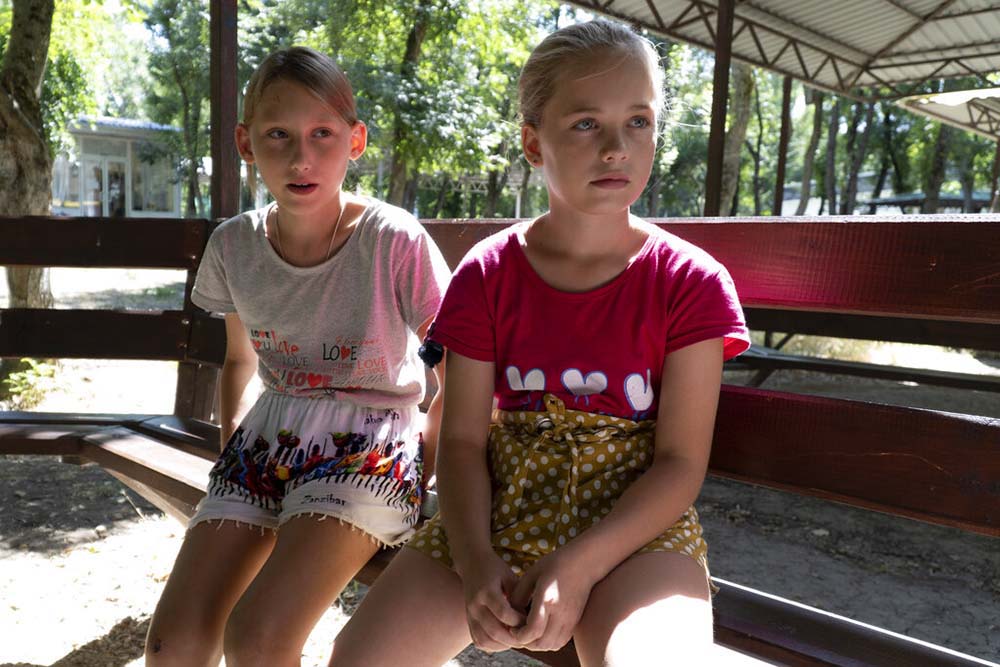 Ukrainian children Olesya Lyadchenko, left, and Yaroslava Rogachyova attend a camp in Zolotaya Kosa, the settlement on the Sea of Azov, Rostov region, southwestern Russia, on Friday, July 8, 2022. Photo: AP via RSS[/caption]
When the bombing approached, Lopatkina decided to head to the borders, fetching her daughter along the way. They made their way to France.
She campaigned with Russian and Ukrainian officials and reached out to activists. The Donetsk authorities finally told her she could have her children back if she came through Russia to get them. She feared a trap and declined.
In the DPR, officials told Timofey a court would strip Lopatkina and her husband of their guardianship and his younger siblings would end up with new families in Russia.
Then finally, a breakthrough. DPR authorities agreed to allow a volunteer with power of attorney from Lopatkina to collect the children.
After a three-day bus trip through Russia, the children met their father in Berlin and drove to France. "The burden of responsibility was gone," Timofey said. "I said: 'Mother, take the reins, that's all ... I'm a child now."
By RSS/AP
READ ALSO:
Ukrainian children Olesya Lyadchenko, left, and Yaroslava Rogachyova attend a camp in Zolotaya Kosa, the settlement on the Sea of Azov, Rostov region, southwestern Russia, on Friday, July 8, 2022. Photo: AP via RSS[/caption]
When the bombing approached, Lopatkina decided to head to the borders, fetching her daughter along the way. They made their way to France.
She campaigned with Russian and Ukrainian officials and reached out to activists. The Donetsk authorities finally told her she could have her children back if she came through Russia to get them. She feared a trap and declined.
In the DPR, officials told Timofey a court would strip Lopatkina and her husband of their guardianship and his younger siblings would end up with new families in Russia.
Then finally, a breakthrough. DPR authorities agreed to allow a volunteer with power of attorney from Lopatkina to collect the children.
After a three-day bus trip through Russia, the children met their father in Berlin and drove to France. "The burden of responsibility was gone," Timofey said. "I said: 'Mother, take the reins, that's all ... I'm a child now."
By RSS/AP
READ ALSO:
 Olga Lopatkina, centre, serves her family a snack, in Loue, western France, on Saturday, July 2, 2022. Photo: AP via RSS[/caption]
Russia claims many of these children have no parents or guardians, or that they can't be reached. But the AP found that officials have deported Ukrainian children to Russia or Russian-held territories without consent, lied to them that they weren't wanted by their parents, and given them Russian families and citizenship.
The investigation is the most extensive to date on the grab of Ukrainian orphans, and the first to follow the process all the way to those already growing up in Russia. It drew on dozens of interviews with parents, children and officials in Ukraine and Russia; emails and letters; Russian documents and Russian state media.
[caption id="attachment_29613" align="alignnone" width="1000"]
Olga Lopatkina, centre, serves her family a snack, in Loue, western France, on Saturday, July 2, 2022. Photo: AP via RSS[/caption]
Russia claims many of these children have no parents or guardians, or that they can't be reached. But the AP found that officials have deported Ukrainian children to Russia or Russian-held territories without consent, lied to them that they weren't wanted by their parents, and given them Russian families and citizenship.
The investigation is the most extensive to date on the grab of Ukrainian orphans, and the first to follow the process all the way to those already growing up in Russia. It drew on dozens of interviews with parents, children and officials in Ukraine and Russia; emails and letters; Russian documents and Russian state media.
[caption id="attachment_29613" align="alignnone" width="1000"] Children from different orphanages from the Donetsk region eat a meal at a camp in Zolotaya Kosa, the settlement on the Sea of Azov, Rostov region, southwestern Russia, on Friday, July 8, 2022. Photo: AP via RSS[/caption]
Raising the children of war in another country or culture can be a marker of genocide, an attempt to erase a people's very identity. Prosecutors tie the policy directly to Russian President Vladimir Putin.
"It's not something that happens spur of the moment on the battlefield," said Stephen Rapp, a former U.S. Ambassador-at-Large for War Crimes Issues who is advising Ukraine on prosecutions.
Russian law prohibits the adoption of foreign children. But in May, Putin signed a decree expediting granting Russian citizenship to Ukrainian children without parental care.
Russia has prepared a register of suitable Russian families for Ukrainian children and offers substantial financial support. It portrays the adoption as an act of generosity. Russian state television airs ceremonies of officials handing out passports to Ukrainian children.
[caption id="attachment_29611" align="alignnone" width="1000"]
Children from different orphanages from the Donetsk region eat a meal at a camp in Zolotaya Kosa, the settlement on the Sea of Azov, Rostov region, southwestern Russia, on Friday, July 8, 2022. Photo: AP via RSS[/caption]
Raising the children of war in another country or culture can be a marker of genocide, an attempt to erase a people's very identity. Prosecutors tie the policy directly to Russian President Vladimir Putin.
"It's not something that happens spur of the moment on the battlefield," said Stephen Rapp, a former U.S. Ambassador-at-Large for War Crimes Issues who is advising Ukraine on prosecutions.
Russian law prohibits the adoption of foreign children. But in May, Putin signed a decree expediting granting Russian citizenship to Ukrainian children without parental care.
Russia has prepared a register of suitable Russian families for Ukrainian children and offers substantial financial support. It portrays the adoption as an act of generosity. Russian state television airs ceremonies of officials handing out passports to Ukrainian children.
[caption id="attachment_29611" align="alignnone" width="1000"] Children from an orphanage in the Donetsk region, eat a meal at a camp in Zolotaya Kosa, the settlement on the Sea of Azov, Rostov region, southwestern Russia, on Friday, July 8, 2022. Photo: AP via RSS[/caption]
How many is hard to say. Ukrainian officials claim nearly 8,000 children have been deported to Russia.
Russia hasn't given an overall number. In March, Russian children's rights ombudswoman Maria Lvova-Belova said 1,000 children from Ukraine were in Russia. Many more have come since, including over 230 in early October.
Lvova-Belova herself has taken in a Mariupol teenager and has been sanctioned by the US Treasury Department, the European Union, Canada and Australia. Her office referred the AP to her reply in astate-owned news agencythat Russia was "helping children to preserve their right to live under a peaceful sky and be happy."
The AP visited a leafy seaside camp near Taganrog, where hundreds of Ukrainian orphans were housed.
One professional foster mother in the Moscow region said the local social services called her to take in Ukrainian children. Already fostering six Russian kids, she picked three from Mariupol. After a guardianship court case in now occupied-Mariupol, she was granted custody of the children, who are now Russian citizens.
The children said after their foster mother dropped them off at a bunker in Mariupol, the Russian military got them out. They had to choose between the adoption by a Russian family and life in a Russian orphanage.
At the house with a courtyard and inflatable swimming pool, the 15-year-old girl said she is eager to start a new life in Russia — in part because her school in Ukraine was bombed, one of her classmates died, and almost everyone has left.
[caption id="attachment_29609" align="alignnone" width="1000"]
Children from an orphanage in the Donetsk region, eat a meal at a camp in Zolotaya Kosa, the settlement on the Sea of Azov, Rostov region, southwestern Russia, on Friday, July 8, 2022. Photo: AP via RSS[/caption]
How many is hard to say. Ukrainian officials claim nearly 8,000 children have been deported to Russia.
Russia hasn't given an overall number. In March, Russian children's rights ombudswoman Maria Lvova-Belova said 1,000 children from Ukraine were in Russia. Many more have come since, including over 230 in early October.
Lvova-Belova herself has taken in a Mariupol teenager and has been sanctioned by the US Treasury Department, the European Union, Canada and Australia. Her office referred the AP to her reply in astate-owned news agencythat Russia was "helping children to preserve their right to live under a peaceful sky and be happy."
The AP visited a leafy seaside camp near Taganrog, where hundreds of Ukrainian orphans were housed.
One professional foster mother in the Moscow region said the local social services called her to take in Ukrainian children. Already fostering six Russian kids, she picked three from Mariupol. After a guardianship court case in now occupied-Mariupol, she was granted custody of the children, who are now Russian citizens.
The children said after their foster mother dropped them off at a bunker in Mariupol, the Russian military got them out. They had to choose between the adoption by a Russian family and life in a Russian orphanage.
At the house with a courtyard and inflatable swimming pool, the 15-year-old girl said she is eager to start a new life in Russia — in part because her school in Ukraine was bombed, one of her classmates died, and almost everyone has left.
[caption id="attachment_29609" align="alignnone" width="1000"] Diana, left, Lena and Sonya, right, from the Donetsk region craft in the playroom at a camp in Zolotaya Kosa, the settlement on the Sea of Azov, Rostov region, southwestern Russia, on Friday, July 8, 2022. Photo: AP via RSS[/caption]
Russia was also accused of stealing children from Ukraine in 2014 after it annexed the Crimean Peninsula. Then, Ukraine reported to the European Court of Human Rights that more than 80 children from Luhansk were abducted at a checkpoint and taken to Russia. Separately, Russian families adopted at least 30 children from Crimea.
This time, at least 96 children have been returned to Ukraine since March following negotiations, some at top government levels.
In Mariupol, Lopatkina's kids cowered for days in a basement at the resort where they'd been vacationing. The 17-year-old foster son, Timofey, minded his younger siblings — three with chronic illnesses or disabilities.
They lost contact with their mother when the power went out across the city. Then a Mariupol doctor succeeded in evacuating them — only to be turned back by pro-Russia forces at a checkpoint. They ended up in a hospital in the separatist Russian-controlled Donetsk People's Republic or DPR.
When Timofey messaged his mother, she was already out of the country. He was livid.
It took a few calls for Olga Lopatkina to explain to Timofey what had happened.
For the music and arts teacher who had lost her mother as a teenager and her home in 2014 fighting, the nightmare with her children was the hardest thing she experienced. When this war broke out, it quickly became deadly to get from her home in Vuhledar, now a front line, to Mariupol, 100 kilometres (60 miles) away. Her 18-year-old biological daughter, Rada, was stranded with her uncle near Kharkiv, another front-line city.
[caption id="attachment_29608" align="alignnone" width="1000"]
Diana, left, Lena and Sonya, right, from the Donetsk region craft in the playroom at a camp in Zolotaya Kosa, the settlement on the Sea of Azov, Rostov region, southwestern Russia, on Friday, July 8, 2022. Photo: AP via RSS[/caption]
Russia was also accused of stealing children from Ukraine in 2014 after it annexed the Crimean Peninsula. Then, Ukraine reported to the European Court of Human Rights that more than 80 children from Luhansk were abducted at a checkpoint and taken to Russia. Separately, Russian families adopted at least 30 children from Crimea.
This time, at least 96 children have been returned to Ukraine since March following negotiations, some at top government levels.
In Mariupol, Lopatkina's kids cowered for days in a basement at the resort where they'd been vacationing. The 17-year-old foster son, Timofey, minded his younger siblings — three with chronic illnesses or disabilities.
They lost contact with their mother when the power went out across the city. Then a Mariupol doctor succeeded in evacuating them — only to be turned back by pro-Russia forces at a checkpoint. They ended up in a hospital in the separatist Russian-controlled Donetsk People's Republic or DPR.
When Timofey messaged his mother, she was already out of the country. He was livid.
It took a few calls for Olga Lopatkina to explain to Timofey what had happened.
For the music and arts teacher who had lost her mother as a teenager and her home in 2014 fighting, the nightmare with her children was the hardest thing she experienced. When this war broke out, it quickly became deadly to get from her home in Vuhledar, now a front line, to Mariupol, 100 kilometres (60 miles) away. Her 18-year-old biological daughter, Rada, was stranded with her uncle near Kharkiv, another front-line city.
[caption id="attachment_29608" align="alignnone" width="1000"] Ukrainian children Olesya Lyadchenko, left, and Yaroslava Rogachyova attend a camp in Zolotaya Kosa, the settlement on the Sea of Azov, Rostov region, southwestern Russia, on Friday, July 8, 2022. Photo: AP via RSS[/caption]
When the bombing approached, Lopatkina decided to head to the borders, fetching her daughter along the way. They made their way to France.
She campaigned with Russian and Ukrainian officials and reached out to activists. The Donetsk authorities finally told her she could have her children back if she came through Russia to get them. She feared a trap and declined.
In the DPR, officials told Timofey a court would strip Lopatkina and her husband of their guardianship and his younger siblings would end up with new families in Russia.
Then finally, a breakthrough. DPR authorities agreed to allow a volunteer with power of attorney from Lopatkina to collect the children.
After a three-day bus trip through Russia, the children met their father in Berlin and drove to France. "The burden of responsibility was gone," Timofey said. "I said: 'Mother, take the reins, that's all ... I'm a child now."
By RSS/AP
READ ALSO:
Ukrainian children Olesya Lyadchenko, left, and Yaroslava Rogachyova attend a camp in Zolotaya Kosa, the settlement on the Sea of Azov, Rostov region, southwestern Russia, on Friday, July 8, 2022. Photo: AP via RSS[/caption]
When the bombing approached, Lopatkina decided to head to the borders, fetching her daughter along the way. They made their way to France.
She campaigned with Russian and Ukrainian officials and reached out to activists. The Donetsk authorities finally told her she could have her children back if she came through Russia to get them. She feared a trap and declined.
In the DPR, officials told Timofey a court would strip Lopatkina and her husband of their guardianship and his younger siblings would end up with new families in Russia.
Then finally, a breakthrough. DPR authorities agreed to allow a volunteer with power of attorney from Lopatkina to collect the children.
After a three-day bus trip through Russia, the children met their father in Berlin and drove to France. "The burden of responsibility was gone," Timofey said. "I said: 'Mother, take the reins, that's all ... I'm a child now."
By RSS/AP
READ ALSO:
Published Date: October 13, 2022, 12:00 am
Post Comment
E-Magazine
RELATED International


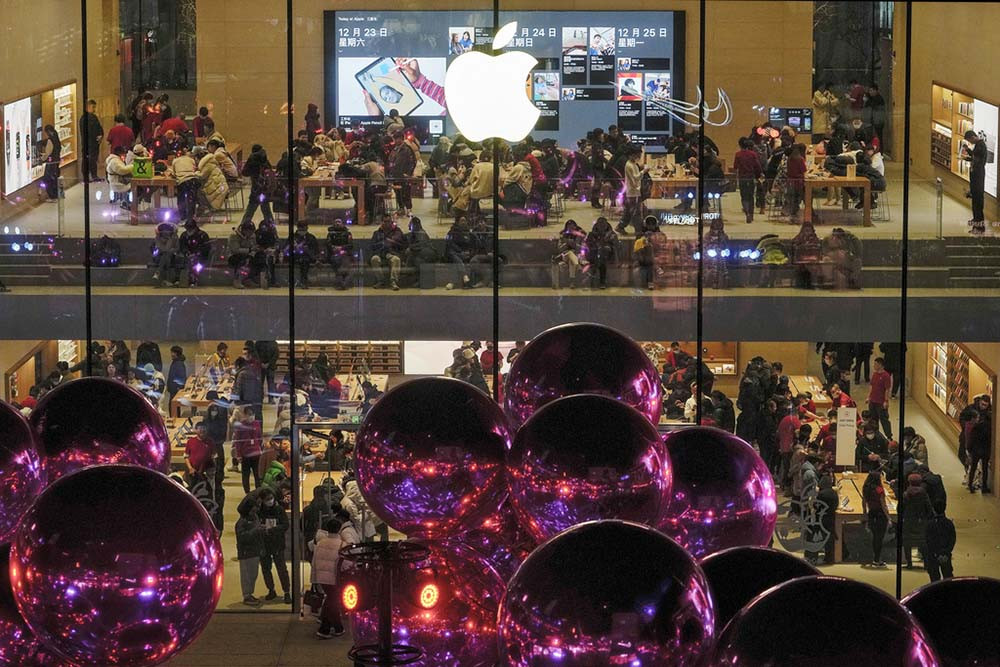
.jpg)
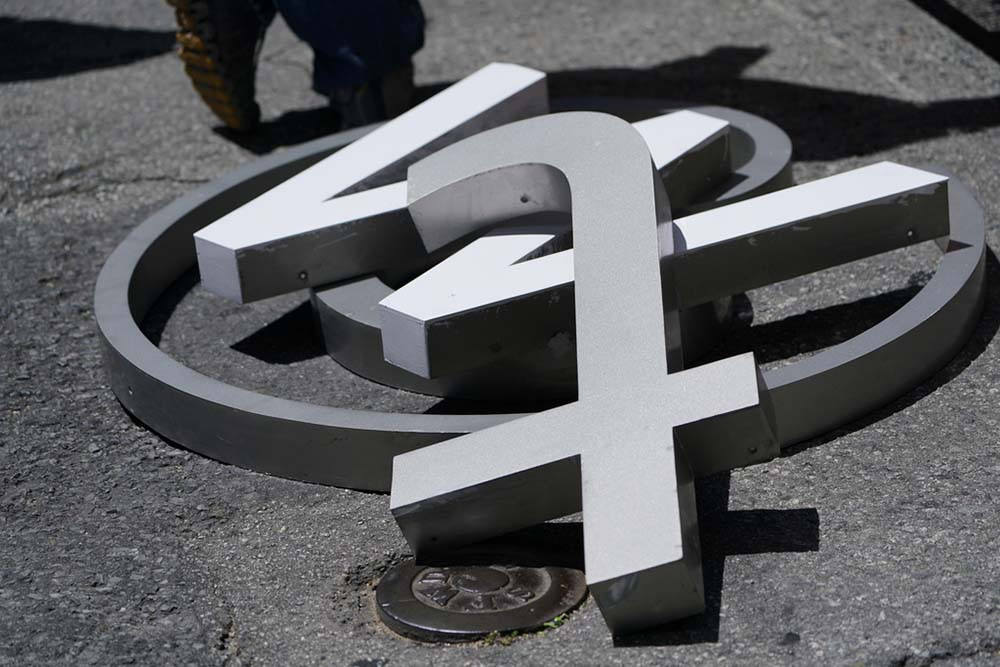
.jpg)